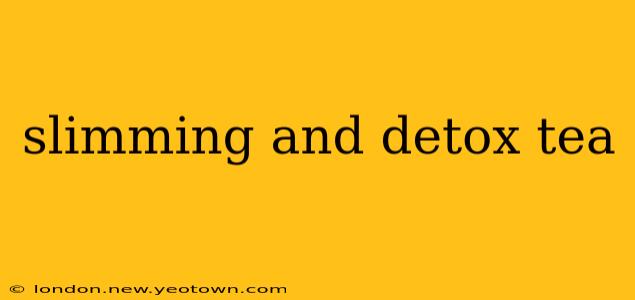The allure of a quick fix is strong, and for those seeking weight loss, the promise of a "slimming and detox tea" can be particularly tempting. Images of slender figures and effortless weight loss often grace the packaging, but the reality is far more nuanced. Let's dive into the world of slimming and detox teas, separating fact from fiction and exploring the potential benefits and risks.
My name is Sarah, and I've spent years researching the impact of nutrition and herbal remedies on overall well-being. While I'm not a medical professional, my research has provided me with a deep understanding of the claims surrounding these teas and the scientific evidence behind them. This article is based on that research and aims to provide you with an unbiased perspective.
What are Slimming and Detox Teas?
Slimming and detox teas typically blend various herbs and ingredients, often marketed with claims to boost metabolism, suppress appetite, cleanse the body of toxins, and promote weight loss. Common ingredients include:
- Senna: A powerful laxative.
- Dandelion: A diuretic.
- Green tea: Contains antioxidants and caffeine.
- Ginger: Known for its anti-inflammatory properties.
While some of these ingredients have individual health benefits, the effectiveness and safety of their combined use in slimming and detox teas are often questionable.
Do Slimming and Detox Teas Really Work?
This is where the truth gets a little complicated. Many of the weight loss claims associated with these teas are largely unsubstantiated. The initial weight loss often experienced is primarily due to the laxative and diuretic effects of some ingredients. This means you're losing water weight, not actual fat. Once you stop consuming the tea, the weight often returns. Moreover, excessive use of laxatives can lead to several health problems.
Are Slimming and Detox Teas Safe?
The safety of slimming and detox teas is a significant concern. While some ingredients may be individually safe, the unregulated nature of many products and the potential for interactions with medications or pre-existing health conditions pose risks. Some teas contain high levels of stimulants that can lead to:
- Heart palpitations
- Anxiety
- Insomnia
- Dehydration
- Electrolyte imbalances
Furthermore, the long-term effects of consuming these teas are largely unknown and haven't been rigorously studied.
Can Slimming and Detox Teas Help with Detoxification?
Our bodies have natural detoxification processes, primarily handled by the liver and kidneys. The idea that these teas can "cleanse" or "detoxify" the body beyond what these organs already do is a misconception. The kidneys and liver are highly efficient at filtering out toxins. While some ingredients might have mild diuretic effects, they don't provide any significant detoxification benefit beyond what your body already does naturally.
What are the Side Effects of Slimming and Detox Teas?
As mentioned earlier, the side effects can be quite unpleasant and even dangerous. These can include:
- Diarrhea: Often a primary effect due to the laxative properties.
- Cramps: Abdominal pain is not uncommon.
- Dehydration: Diuretics can lead to significant fluid loss.
- Nutrient deficiencies: Chronic diarrhea can interfere with nutrient absorption.
Severe side effects, though less common, are still a possibility. Always consult a doctor before using any slimming or detox tea, especially if you have pre-existing health conditions.
Are there healthier ways to lose weight and detoxify?
The healthiest approach to weight loss involves a balanced diet, regular exercise, and sufficient hydration. Focusing on whole, unprocessed foods and engaging in physical activity are far more effective and sustainable methods than relying on quick-fix solutions like slimming and detox teas. True detoxification comes from supporting your body's natural functions through a healthy lifestyle.
Remember, consulting a healthcare professional or registered dietitian is always recommended before making significant dietary changes or trying any weight-loss product. They can provide personalized advice tailored to your individual needs and health status. Prioritize a holistic approach to well-being that includes nutritious eating, regular exercise, and mindful self-care. This approach provides far more lasting results than any quick-fix solution.

